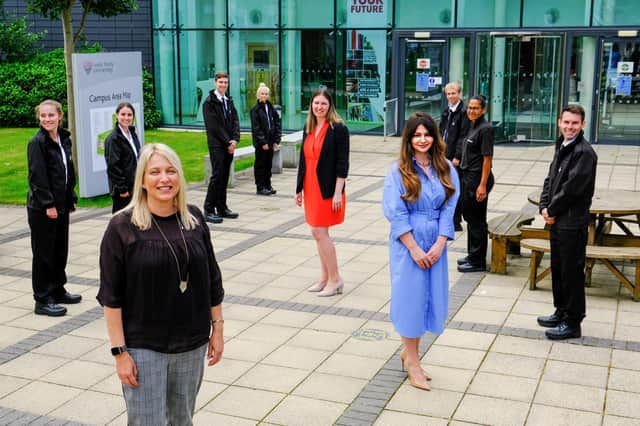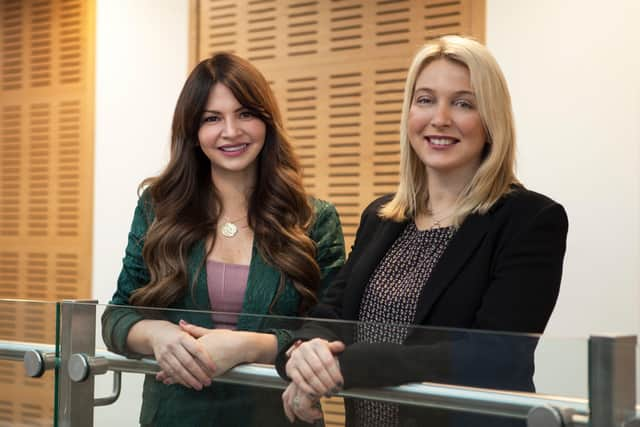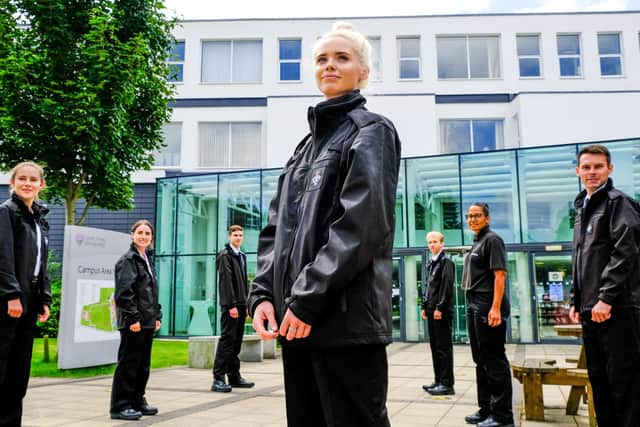High-flying graduates are being trained in Leeds to reform the nation’s prisons


As demanding jobs go, there are few tougher than being a prison officer.
In the 12 months to March, almost 10,000 assaults on staff were recorded in the nation’s jails, with 953 of them classified as “serious” by the Ministry of Justice – a category which includes the following list of injuries; “a fracture, scald or burn, stabbing, crushing, extensive or multiple bruising, black eye, broken nose, lost or broken tooth, cuts requiring suturing, bites, temporary or permanent blindness”.
Advertisement
Hide AdAdvertisement
Hide AdIt is clearly not a role for the faint-hearted, but that did not prevent around 2,000 high-flying graduates applying for just over 100 places on a pioneering Government-backed training programme that started at Leeds Trinity University last month to find the next generation of prison officers.


With around half of adult prisoners reconvicted within a year of release at an estimated cost to the taxpayer of £18bn per year, the ambitious aim of the ‘Unlocked Graduates’ initiative is to reform the way jails operate and improve rehabilitation rates to the wider benefit of society.
It aims to be the prison system’s answer to the Teach First scheme, which has placed ambitious graduates, often from elite universities, into inner-city schools in an effort to tackle educational inequality.
While Unlocked is starting at Leeds Trinity for the first time after the university won the contract, the course was founded in 2016 after a review of prison education by Dame Sally Coates found recognition of the importance of educating prisoners to help cut reoffending rates “appeared to have been lost” in the nation’s jails.
Advertisement
Hide AdAdvertisement
Hide AdIt has not been without controversy; one of its earliest recruits ended up being jailed himself for over six years after being caught trying to smuggle drugs and phones into a prison he was working in.


But the overall project has cross-party support – Justice Secretary Robert Buckland addressed the latest recruits at their opening ceremony, while his Labour counterpart David Lammy is speaking during the last week here.
The challenge is acute; last year Peter Clarke, the Chief Inspector of Prisons, warned “far too many of our jails have been plagued by drugs, violence, appalling living conditions and a lack of access to meaningful rehabilitative activity”.
The most recent MoJ statistics revealed self-harm incidents in prisons in the last 12 months had reached a record high of 64,500, with 76 apparent suicides.
Advertisement
Hide AdAdvertisement
Hide AdParticipants on the Unlocked programme are at in the opening stages of a two-year leadership scheme for prison officers.
The course has begun with an intensive six-week training programme at Leeds Trinity’s campus in Horsforth and from next month, the group will go their separate ways to begin working full-time in understaffed prisons across the country while studying part-time for a Masters degree in Applied Custodial Leadership.
Dr Danielle McDermott, programme lead for the MSc Applied Custodial Leadership at Leeds Trinity University, has developed the Leeds Trinity programme alongside university colleague Claire Vilarrubi, a former prison governor.
Before becoming a lecturer, McDermott worked as a psychologist at HMP Leeds – where she first met Vilarrubi – and HMP YOI Wetherby, and won a national Prison Service Staff of the Year Award. She says the standard of those on the course is inspiring.
Advertisement
Hide AdAdvertisement
Hide Ad“The cohort are just excellent. It is so exciting,” she says.
“I didn’t leave the service because I didn’t enjoy it, I loved what I did. I did get frustrated at times at things and this is where I think this programme can make a difference.
“It is a mixture of graduates and career changers. Somebody has come from the military for example but the majority of them are fairly recent graduates. Around 50 per cent come from a social sciences background.
“One of the questions we asked those applying was ‘What is your motivation for being in the programme?’
Advertisement
Hide AdAdvertisement
Hide Ad“The most common answer was it is the challenging nature of the role. They are not going to be sat behind a desk. They are realistic, but if they can change one person’s life that will make a big difference and they want to make a difference and help people.
“The Prison Service really does need this. Reoffending rates are really high – we spend a lot on prisons but actually does it work? They really want to change the perception of prisoners and rehabilitation.”
The initial six weeks of training is designed to make the cohort “prison ready”.
“They start as a prison officer and will do everything that any prison officer would do,” says McDermott. “They do a part-time Masters alongside that which is fully funded. Claire and myself have done academic degrees alongside full-time work so we really do understand what it is like.”
Advertisement
Hide AdAdvertisement
Hide AdOne of the aims of the course is to make the traditionally male-dominated prison service more diverse and an attractive option to ethnic minorities and women.
“I think women bring a lot to the table across lots of different industries,” says McDermott. “It just offers a different perspective.
“It is not men versus women but women have a lot to offer the prison service.
“Diversity in recruitment is a big focus for Unlocked and they were featured in the Lammy review as a possible model for more representative prison officer recruitment. Approximately 16 per cent of this year’s participants are from black and other minority ethnic backgrounds, but this is always something we are striving to improve upon.”
Advertisement
Hide AdAdvertisement
Hide AdMcDermott admits the programme’s attempt to shake-up the prison system will not be universally welcomed.
“It is not traditionally a job with a graduate background. Like the police and probation, we are really trying to move towards professionalising the role of a prison officer.
“I will be honest, there will be some pushback but when I started, I got pushback as a prison psychologist along the lines of ‘you just want to hug everybody’, that kind of thing.
“One of the things we encourage within the programme is when you get that kind of resistance, trying to understand where it comes from.
Advertisement
Hide AdAdvertisement
Hide Ad“A lot of the time when you experience negativity it often comes from fear of the unknown.”
McDermott says those who graduate are expected to progress through their careers quickly and move into leadership positions, either within the Prison Service or outside it.
“Unlocked is a leadership programme and the aim is to develop future leaders in the criminal justice system. We want them to understand the frontline but with the people we have recruited, it is our intention that they will be able to change things from the top down. That is what is needed.”
So what does she believe needs to change?
“It is so complex, but one of the big things is over 44,000 prisoners served less than six months – about half of all people sent to prison.
Advertisement
Hide AdAdvertisement
Hide Ad“With short-term sentences, if you get six months you actually serve three. You can’t do much with someone in terms of rehabilitation in that time but prison can actually make them worse. If they did have a job and a home, there is a good chance they will lose them in that time. They are going to lose more than they gain.
“Prison officers and prisons in general need a voice. I think it is something society needs to be aware of. We can’t keep closing our eyes and ears and pretending it isn’t happening and that everything is ok as long as it isn’t happening in my backyard.
“If we don’t give people a chance, prison will be a continually revolving door. We do some fantastic things in prisons but it is almost like you are setting people up to fail with short-term sentences. One of the big things with this programme is about changing public perceptions of the role of prison officers and promoting the fact that people can change.”
What makes a good prison officer
Dr Danielle McDermott says having an open mind is an essential part of being an effective prison officer.
Advertisement
Hide AdAdvertisement
Hide Ad“You have got to be non-judgmental, have really good communications skills and be able to deal with people calmly and decently. You have got to have an open mind and you have got to believe people can change.
“It is all about building relationships and understanding people. Respect is a big word but treating people decently is the key. There is every type of person in prison.
“The best prison officers I worked with maintained really good boundaries but were able to be consistent, open-minded, honest and kind. If they said they were going to do something, they would do it. That kind of consistency paid dividends.”
Support The Yorkshire Post and become a subscriber today.
Your subscription will help us to continue to bring quality news to the people of Yorkshire. In return, you’ll see fewer ads on site, get free access to our app and receive exclusive members-only offers.
Advertisement
Hide AdAdvertisement
Hide AdSo, please - if you can - pay for our work. Just £5 per month is the starting point. If you think that which we are trying to achieve is worth more, you can pay us what you think we are worth. By doing so, you will be investing in something that is becoming increasingly rare. Independent journalism that cares less about right and left and more about right and wrong. Journalism you can trust.
Thank you
James Mitchinson